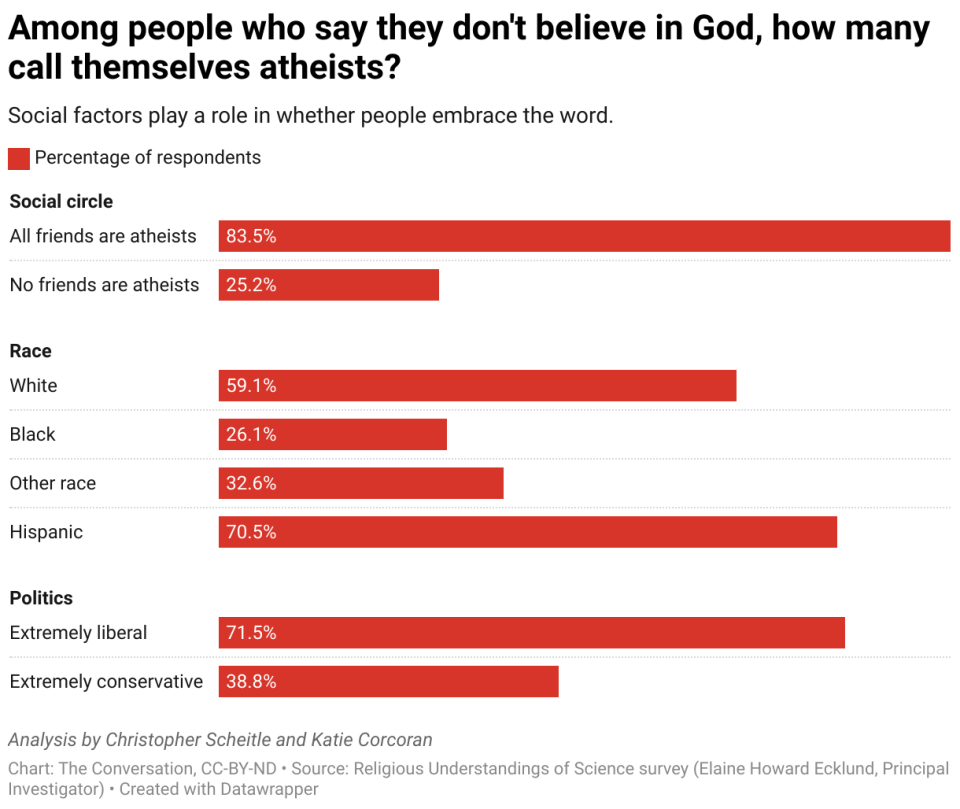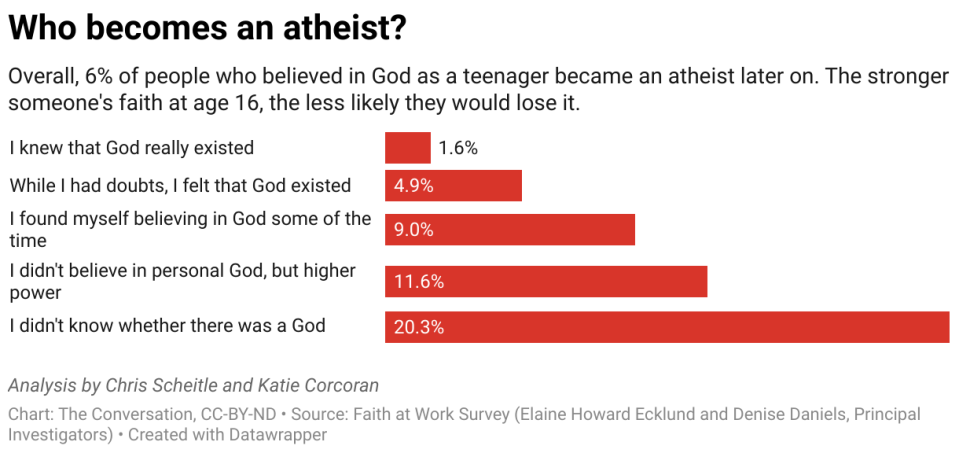The number of individuals in the United States who do not identify as part of any religion has grown dramatically in recent years, and “the nones” are now larger than any religious group. According to the General Social Survey, religiously unaffiliated people represented only about 5% of the U.S. population in the 1970s. This percentage started to increase in the 1990s and is now around 30%.
At first glance, some might assume that this means that almost 1 in 3 Americans are atheists, but that is far from the truth. Only about 4% of American adults identify as atheist.
As sociologists who study religion in the US, we wanted to learn more about the gap between these percentages and why some individuals identify as atheist while other unaffiliated individuals do not.
Many shades of ‘none’
The religiously unaffiliated are a diverse group. Some still attend services, say they are at least somewhat religious, and express some level of belief in God – although they tend to do these things at a slower rate than individuals who do identify with a religion. identify.
There is even diversity in the way religiously unaffiliated individuals identify themselves. When surveys ask about their religion, unaffiliated people’s answers are “agnostic,” “no religion,” “nothing in particular,” “none,” and so on.
Only about 17% of religiously unaffiliated people explicitly identify as “atheist” in surveys. For the most part, atheists reject religion and religious concepts more actively than other religiously unaffiliated individuals.
Our recent research explores two questions related to atheism. First, what makes someone more or less likely to identify as an atheist? Second, what makes someone more or less likely to adopt an atheistic worldview over time?
Beyond belief – and disbelief
Consider the first question: Who is most likely to identify as an atheist? To answer that, we also need to think about what atheism means in the first place.
Not all religious traditions emphasize belief in a deity. However, in the American context, atheism, especially within traditions such as Christianity, is often equated with saying that someone does not believe in God. Yet in one of our surveys, we found that among American adults who say, “I don’t believe in God,” only about half will choose “atheist” when asked about their religious identity.
In other words, rejecting a belief in God is by no means a sufficient condition for identifying as an atheist. So why do some people who don’t believe in God identify as atheists, while others don’t?
Our research found that there are a number of other social forces associated with an individual’s likelihood to identify as an atheist, in addition to their disbelief in God – especially stigma.
Many Americans view atheists with suspicion and disgust. Interestingly, some social science surveys in the US include questions about people’s tolerance for atheists, in addition to questions about tolerance for racists and communists.
This stigma means that being an atheist comes with potential social costs, especially in certain communities. We see this dynamic game in our data.

For example, political conservatives are less likely to identify as atheists, even if they do not believe in God. Just under 39% of people who identify as “extremely conservative” and say they do not believe in God identify as atheist. This compares to 72% of individuals who identify as “extreme liberal” and say they do not believe in God.
We argue that this is likely a function of greater negative views of atheists in politically conservative circles.
Adopting atheism
However, claiming that one does not believe in God is the strongest predictor of identifying as an atheist. This leads to our second research question: what factors make someone more or less likely to lose faith over time?
In a second survey-based study, from another representative sample of nearly 10,000 American adults, we found that about 6% of people who declared they had some level of belief in God at age 16 went on to say : “I do not believe in God”. God” as an adult.
Who falls into this group is not random.
Our analysis shows, perhaps unsurprisingly, that the stronger a person’s belief in God was at age 16, the less likely they are to have adopted an atheist worldview as an adult. For example, fewer than 2% of people who said as teenagers, “I knew God was real and I had no doubts about it,” later adopted an atheist worldview. This compares to more than 20% of those who said, “I didn’t know if there was a God and I didn’t believe there was any way to find out” when they were 16.


However, our analysis shows that several other factors make someone more or less likely to adopt an atheist worldview.
For example, no matter how strong their teenage faith, black, Asian and Hispanic Americans were less likely than white individuals to identify as atheists later. All else being equal, individuals in these groups were about 50% to 75% less likely to adopt an atheist worldview than white individuals. In part, this may be due to the fact that groups that already face stigmatization related to their race or ethnicity are less able or willing to absorb the additional social costs of being atheists.
On the other hand, we see that adults with more income – regardless of how strong their faith was at age 16 – are more likely to take the position that they do not believe in God. Each increase from one income level to another on an 11-point scale increases the likelihood of adopting an atheist worldview by about 5%.
This could be a function of income providing a buffer against any stigma associated with adhering to an atheist worldview. For example, having a higher income can give someone the tools necessary to avoid social circles and situations where being an atheist might be treated negatively.
However, there may be another explanation. Some social scientists have suggested that both wealth and faith can provide existential security – the confidence that you will never face tragedy – and that higher income therefore reduces the need to believe in supernatural forces in the first place .
Such findings are a powerful reminder that our beliefs, behaviors, and identities are not entirely our own, but are often shaped by the situations and cultures in which we find ourselves.
This article is republished from The Conversation, an independent nonprofit organization providing facts and trusted analysis to help you understand our complex world. It was written by: Christopher P. Scheitle, University of West Virginia and Katie Corcoran, University of West Virginia
Read more:
Christopher P. Scheitle receives funding from the National Science Foundation and the John Templeton Foundation. The research presented here was supported in part by the Exploring Atheism project at Queen’s University Belfast.
Katie Corcoran receives or has received funding from the National Science Foundation, the John Templeton Foundation, the Patient-Centered Outcomes Research Institute, Presbyterian Health Foundation, Society for the Scientific Study of Religion, International Research Network for the Study of Belief and Science, and West Virginia University Humanities Center.